1
Mum And Dad
My Parents Dora and Vernon Lilley were dairy farmers on Three Mile Bush Road in the Whangarei suburb of Kamo. There was a unique factor in that there were four families of Lilleys farming next door to each other. We were all dairy farmers and we were all related. My father couldn’t go to war as he had chronic asthma and had stomach ulcers. Having taken over the family farm at age 19 when his father died accidentally, Dad served on the Home Guard and hosted American soldiers. They were there because the government of the day thought the Japanese, who had a major presence in the Pacific, might invade New Zealand.
Mum (Dora) was the eldest of five children. She wanted to be a seamstress, but her dad didn’t want a bar of that so she married and became a farmer’s wife. She was very creative with her sewing and made dresses for me. She once raised funds for Country Women’s Institute by making 200 aprons, each with a design by machine. She was a champion at doing floral arrangements. Later on she learnt Chinese brush work, painting flowers on rice paper. Then, when her eyes began to fail, her mind turned to poetry about cats and their personalities. Each morning I would ring her and she would tell me what to type on my computer as I would have my headset on to receive it from Whangarei. My Uncle Noel Hutchinson was a dairy farmer and orchardist. I remember a peach orchard that was near the farmhouse. My Aunty Lucy married Allan Miller, a harbour board accountant who lived in Auckland. My Uncle Teddy (William Teasdale Hutchinson) never married. He volunteered to go to World War II. Enlisting was not a requirement as he was a farmer’s son. He served as a signaller in the NZ Army with the 21st Battalion B Company. In this role he carried a radio on his back reporting back to battalion headquarters as the company progressed, even under fire. On one occasion his aerial was disabled, so he laid his wireless equipment aside and grabbed a machine gun, shot the enemy until they were gone, then returned to repair the aerial, moving on with his company and keeping the battalion headquarters informed as they went. It was for this action that he was awarded the Military Medal. This was later presented by the Governor General Sir Bernard Freyberg at Greenlane Hospital where he spent the last two years of his life. He lost a leg in the Rimini area in Italy and acquired a wooden leg to come home. During his time in the army he contracted TB which meant he had a long stay in hospital back in New Zealand after the war. He was the only soldier in the immediate family, and was promoted to Lance Corporal. The youngest in my Mum’s family was Vera who was eighteen years younger than Mum. Vera married Jack Teal who was a dairy fairy farmer too.
Rubella And Its Scars
I was born in 1943 on the 18th of April and had a brother Ross who was five and a half years older than me. He married Nola. They had two children. Megan married Glenn Gibson and they live in Canada with their daughter Alexa. Ross and Nola’s son Craig lives in Whangarei NZ.
Mum and Dad were looking forward to having another child and all seemed to be well until they noticed that my eyes didn’t look right. Mum had contracted a mild form of German measles three months into her pregnancy, which we now know can affect the foetus. It was one of the American medics who advised my parents that they should take me back to the doctor. They found that I had a double cataract which meant I was totally blind.
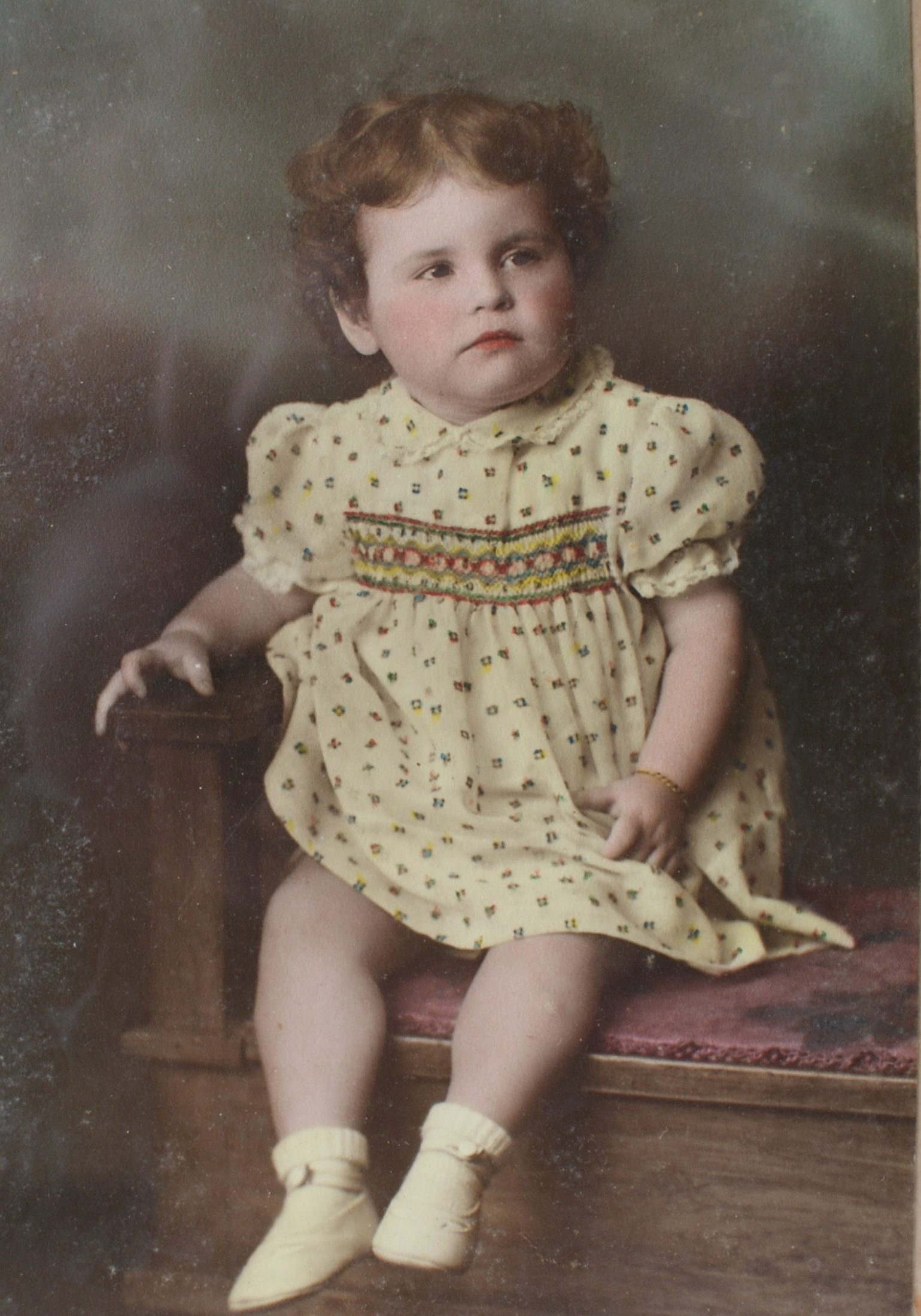
They were broken-hearted and shocked as the doctor hadn’t picked it up at birth. Mum didn’t take that lying down. She got up, packed her bag and took me to Auckland. We stayed with my Aunt Adelaide and Uncle Harold. I always called her Aunty Owl. They helped Mum find a doctor who was willing to remove the cataract as soon as possible. Mum tramped the streets until she found Dr James Beaumont, who I believe was a pioneer in groundbreaking surgery. He removed the cataract from my eyes when I was only about 6 months old. None of the other doctors would consider surgery until I was two years of age. Dr Beaumont did one eye and went back to the States for about three months. On his return he rang Mum to find out whether I could see. Her reply was “yes”, so he did the other eye which gave me about 60% of my sight with glasses. These are the only operations I’ve had for my sight and I’ve been able to live a pretty normal life. It really was a miracle that Dr Beaumont was able to do the operation and give me as much as 60-70 % of my sight, using glasses. One thing I’m unable to do is drive a car but I tell folk that if I did you wouldn’t see me for dust! In other words I value my independence.
Leaving Home
My parents thought I needed a stimulating environment in which I would learn my self-help skills without being spoilt. So, when I was four-and-a-half, Mum took me to Sunrise Home for preschool blind children in Victoria Avenue, Remuera. The building had been a doctor’s home which was donated to the Foundation of the Blind, which was known as the Blind Institute in those days.
I don’t remember Mum saying goodbye to me when she left me in the play room at Sunrise Home but I think she would have been relieved to see me amusing myself with the brightly coloured blocks I had found to play with. She would have watched through the door window of the playroom for a little while and plucked up the courage to go home. I don’t remember my parents ever telling me that they loved me but, of course they did, or they would not have tried so hard to find out whether I would be able to see. In that generation they concentrated on providing everything their children needed. I was well into my 30s before I really understood this emphasis on practical needs as an expression of their love.
Sunrise
The matron was quite strict. The beds had to be all in line with no creases in the quilts and no lumps in the kapok mattresses. We were up at 7am and shown how to get dressed and turn down our beds onto a chair. Breakfast was porridge and toast. I liked honey on mine. A bit about bed making. Yes, at 5 years old we learnt to make our beds. Drawing the sheets and blankets up from the chair made it easy to keep the bed clothes even across the bed. Matron organised the staff who taught us how to get dressed by putting our garments on the floor along the skirting board. All our clothes had name tags at the back of the neck or waist. By lining these up against the skirting board we could tell which was the back and the front. They taught us to feel the seams. When the seam was smooth, it was the right way out. If it was rough, you knew it was inside out. This was the beginning of being able to care for ourselves.
The house was a big wooden villa with lovely old trees complete with swings, seesaws, a sandpit and a couple of trikes. We discovered how to play and how to use the things on the playground and had lots of fun. I liked the trikes and remember crashing into the garage door. Inside we had a big playroom with a staircase, lots of blocks, and a gramophone. It was on the gramophone I heard Pōkarekare Ana for the first time. Also E Papā Waiari, the Maori stick game.
Settling In
A memorable event at this time was a visit by Helen Keller. My photo was taken while I was sitting on her knee, but I don’t remember much about the occasion. I still have the photo. My life long school friend Lottie was in Sunrise too. We did all our education in Parnell. I would help Lottie choose the clothes she wore as she couldn’t see the colours. On leaving school we went our separate ways until we met up at a school reunion. By this time she had been married to an instrument repairer who had died. I was working with the elderly at the time and invited her to play the piano for them. Lottie had connections too so we would work together going to church halls and rest homes to bring them cheer with our music. One time my friend Judith took us to Selwyn Park rest home where Mum was staying. They really enjoyed it.
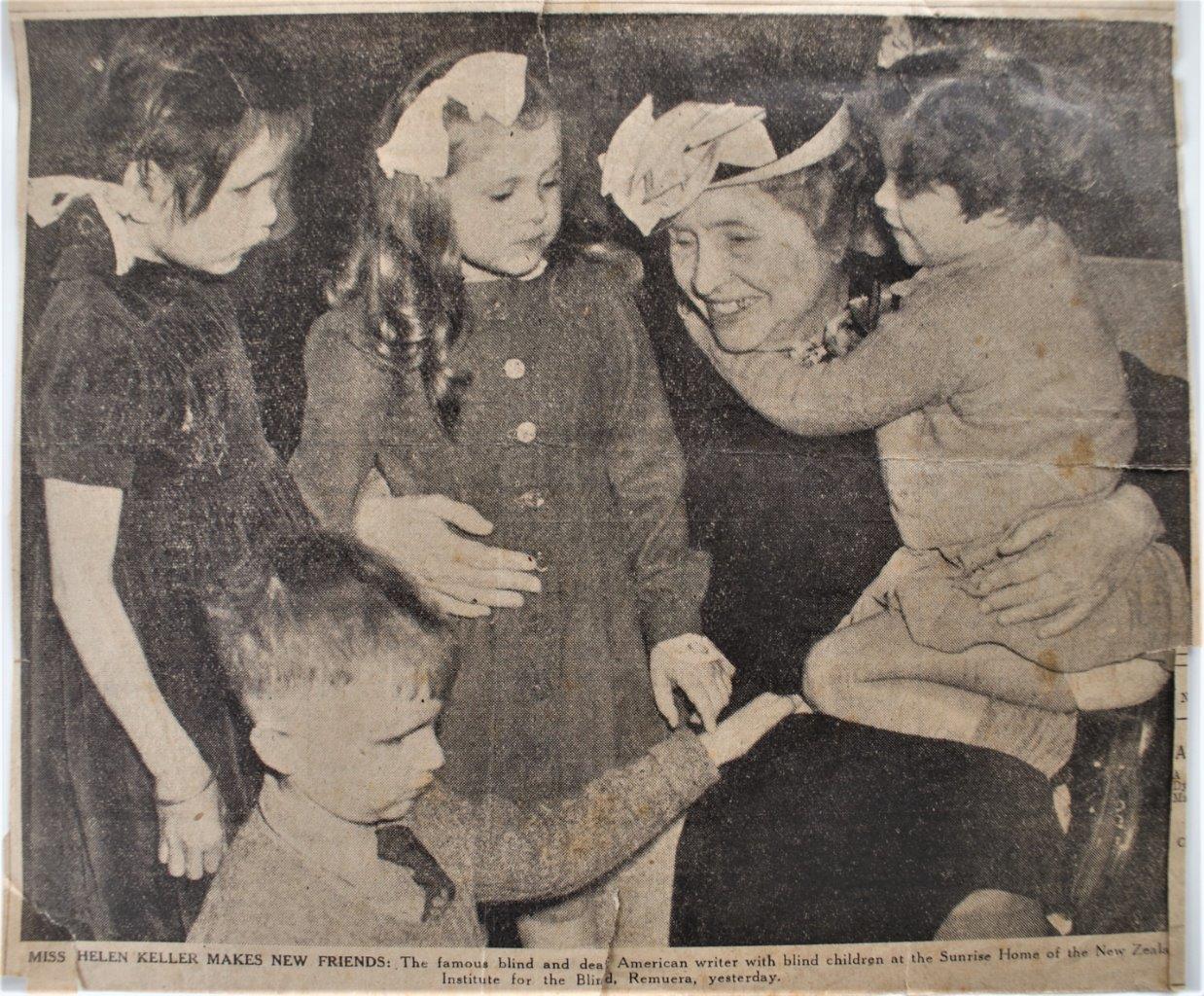
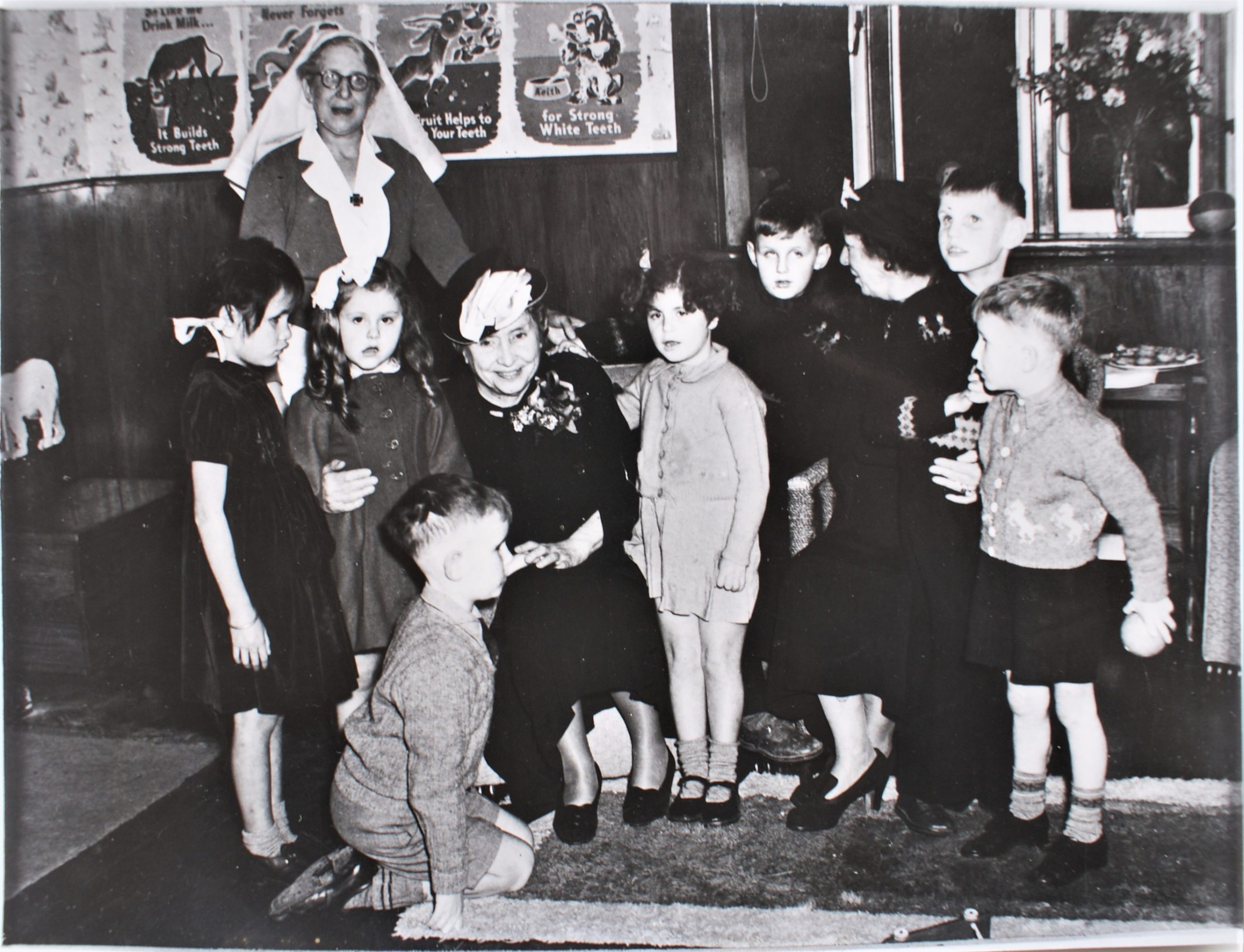
There was a change of matrons about a year after I arrived. The new matron wanted to adopt me and take me back to England with her. She was a very motherly soul and I might have gone with her if the choice had been mine, but my parents said “no. ” That was a real indication that indeed they truly loved me. That must have been a real wakeup call for them. I’m so glad it happened the way it did because I became more sure of their love for me.
I never remember a time when I didn’t know God or should I say, a very strong hunger for knowing Him. I went to a Kindy Sunday School class while at Sunrise and heard stories about Jesus but no one ever told me who He was. When I grew older I would ask the other kids about God and Jesus and ask “Why do we need so many different churches?”
The Fire
In December of 1949 our home was set on fire as a result of arson. My memory of the fire is of seeing a smouldering pile of hot white ashes behind the hedge that was around the house. The only things that were saved were a Beatty washing machine, an eiderdown and Dad’s dinner jacket. Following the fire we lived where the tractor and car were kept and the implement shed became our kitchen for three years. My brother Ross, who was a boarder at Whangarei Boys’ High, and I slept in a little mezzanine floor at the back of that shed when we went home in the holidays. My parents were thinking that the price of building a new home would go down but of course it didn’t. After three years they decided to rebuild on the same site because the farm needed a house.
Christmas
A memory of Christmas at that time goes like this: My brother Ross was told to take the kids for a ride on the sledge behind Topper, the horse. The sledge was usually used to take the milk cans out to the road. We all had our Sunday best outfits on because it was Christmas Day. As the sledge went along it flipped on a boulder and we ended up underneath the sledge with our party dresses spotted with mud. My dress was pink voile, now with brown spots. Amazingly, no-one was badly injured. At dinner time we queued up with only one plate for the main course, then washed the plates up for our steam pudding with sixpences in it. There was another time when I stayed at Moira’s place and we were walking across a paddock and there was a drain that I should have stepped over, but I fell in it!! We laughed a lot! I’m not sure what year the polio epidemic occurred, but we had an extended summer holiday and didn’t start school until Easter because of it.
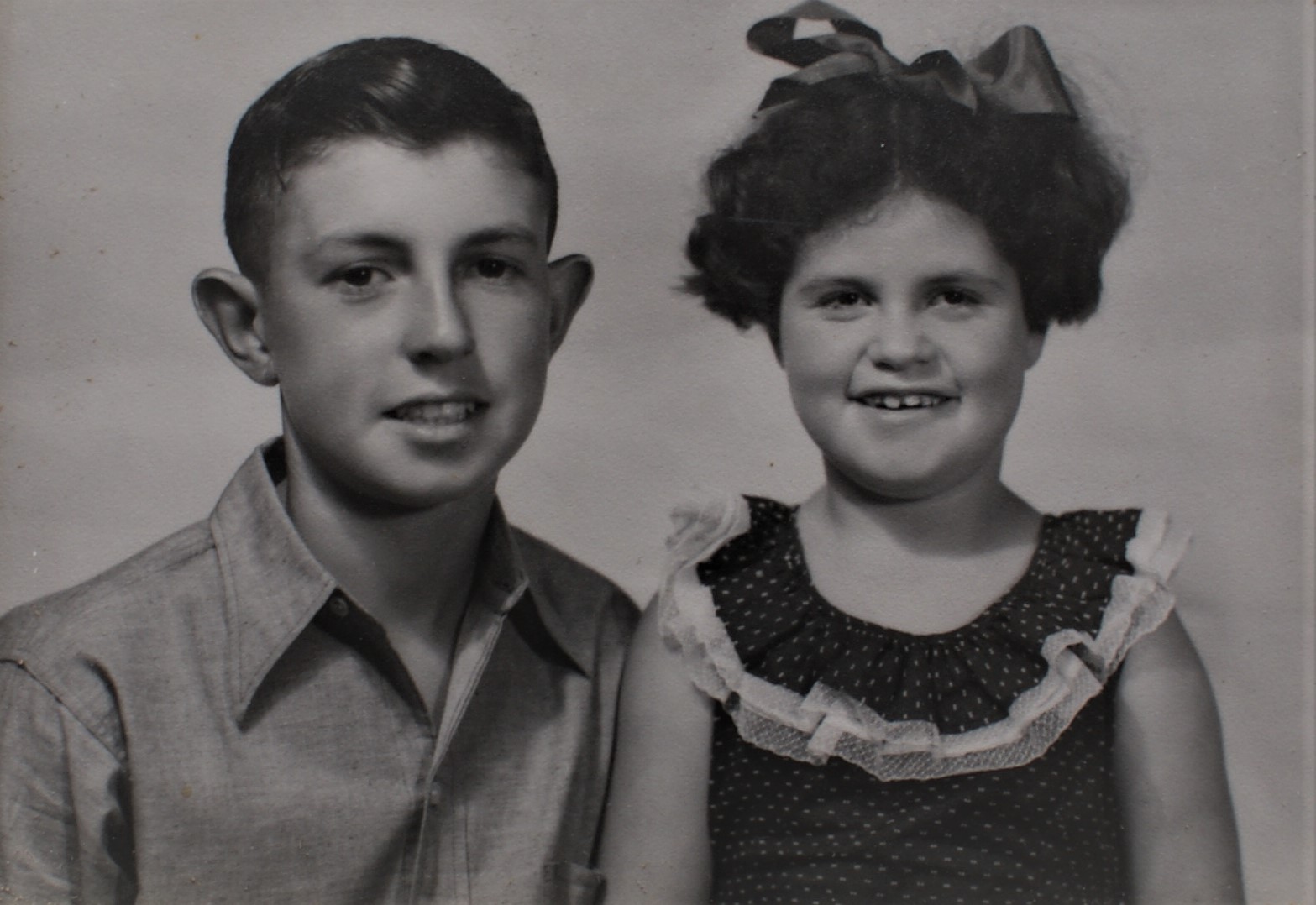
Transfer To Main Building
In 1949, the same year that our house went up in smoke, I was moved to the Royal New Zealand Foundation of the Blind main building to commence my formal education. It was in Parnell Rd where the Parnell Public Library is today. When I turned five I went daily by taxi to the Institute and started to learn Braille. However, I found it much easier to read it with my eyes than my fingertips. My teacher was blind and so she couldn’t see what I was doing. One day someone who had sight came in and noticed what I was doing and told the headmaster. He had been thinking about making a Sight Savers class as there were others who were doing the same thing and not progressing very far with Braille reading. It held me back for almost four years.
Method Of Learning Changed
It was great being in the new class with 27 fluorescent bulbs that didn’t cast any shadow on our work- a startling invention just 20 years after electricity was introduced to urban New Zealand. Our class was like a one teacher school of Primer 4 to Form 2 with pupils who had varying levels of sight. We flourished in our new environment, eager to learn as we were shown how to draw the big print letters, then made them smaller as we got better at writing them. Large print books began to appear and so we started reading. The arithmetic took off too. Learning was becoming fun.
Hearing Loss
It was some time before my deafness was diagnosed. During that year I was given some speech therapy for about 6 months. This helped me to identify sounds and learn to move and shape my mouth to create the right shapes and sounds. I tried a hearing aid but found it too echoey, making hearing even more difficult. I miss the beginnings and ends of words, but my brain automatically fills them in for me. A specialist once told me that not having hearing aids as a child challenged the brain to do this. I see this as a good thing.
Due to the hearing loss, I was not good at spelling and didn’t enjoy writing essays. Arithmetic was OK but I didn’t like long division. Music and Social Studies I really enjoyed. We had a gym and we did do sports. I remember playing hockey on the asphalt with a straight tea tree stick and an Elastoplast tin so we could hear where it was. Later on we had a metal ball, which we often cracked in two, requiring a welding repair. Being a left-hander, I like playing on the left wing.
Concert
Once a year we would put on a concert for our parents. Our teachers were good. They had passion and compassion to give us their best in education. In my final year of school I was taught how to do typing by touch. I was very grateful to Miss Faroley for extending us as far as she could into the third form as I was denied secondary education due to being older than the other children and a ‘slow learner’.
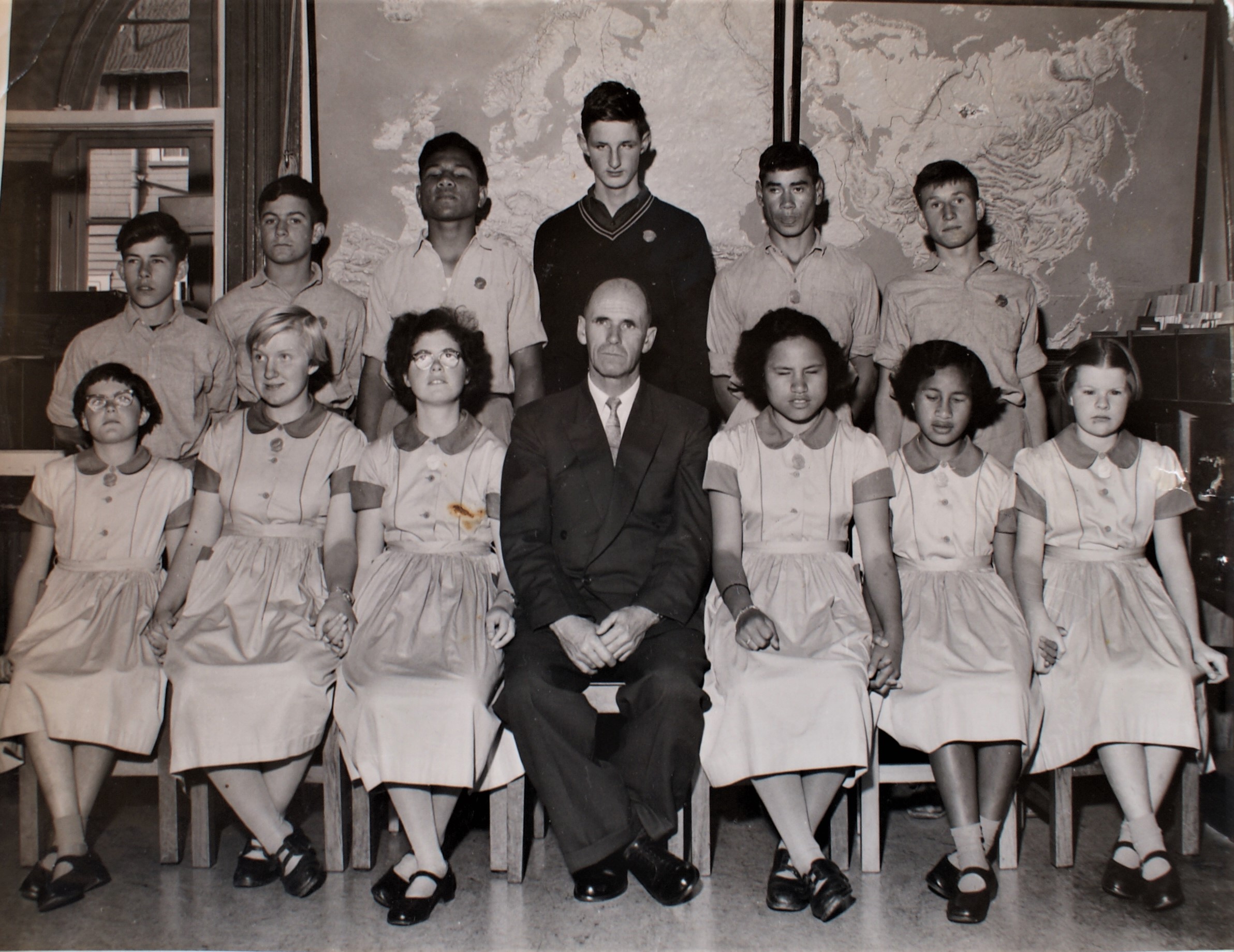
Co-ed School
We were in a boarding school with both the girls and boys on site in separate houses. Outside of school hours we had to keep to the main house, known as the ‘Girls’ side’, while the boys lived in Nathan House which was at the side of the main building and known as ‘the Boys’ side’. During the school day our classes were mixed gender like a co-educational school and we played together at play times and for sports. The junior dormitory housed girls aged seven to 11 or 12. We moved up to the senior dorm after that. As a vacancy became available we would be given a cubicle where we learnt to look after our own room by keeping it clean and tidy. We came together for meals in the dining room. Every meal began with the singing of grace accompanied by piano or pipe organ. The boys were on one side and the girls on the other. We got up at 6.30 am, washed, dressed and made our beds by 7.30 am when the first piano practice time started.
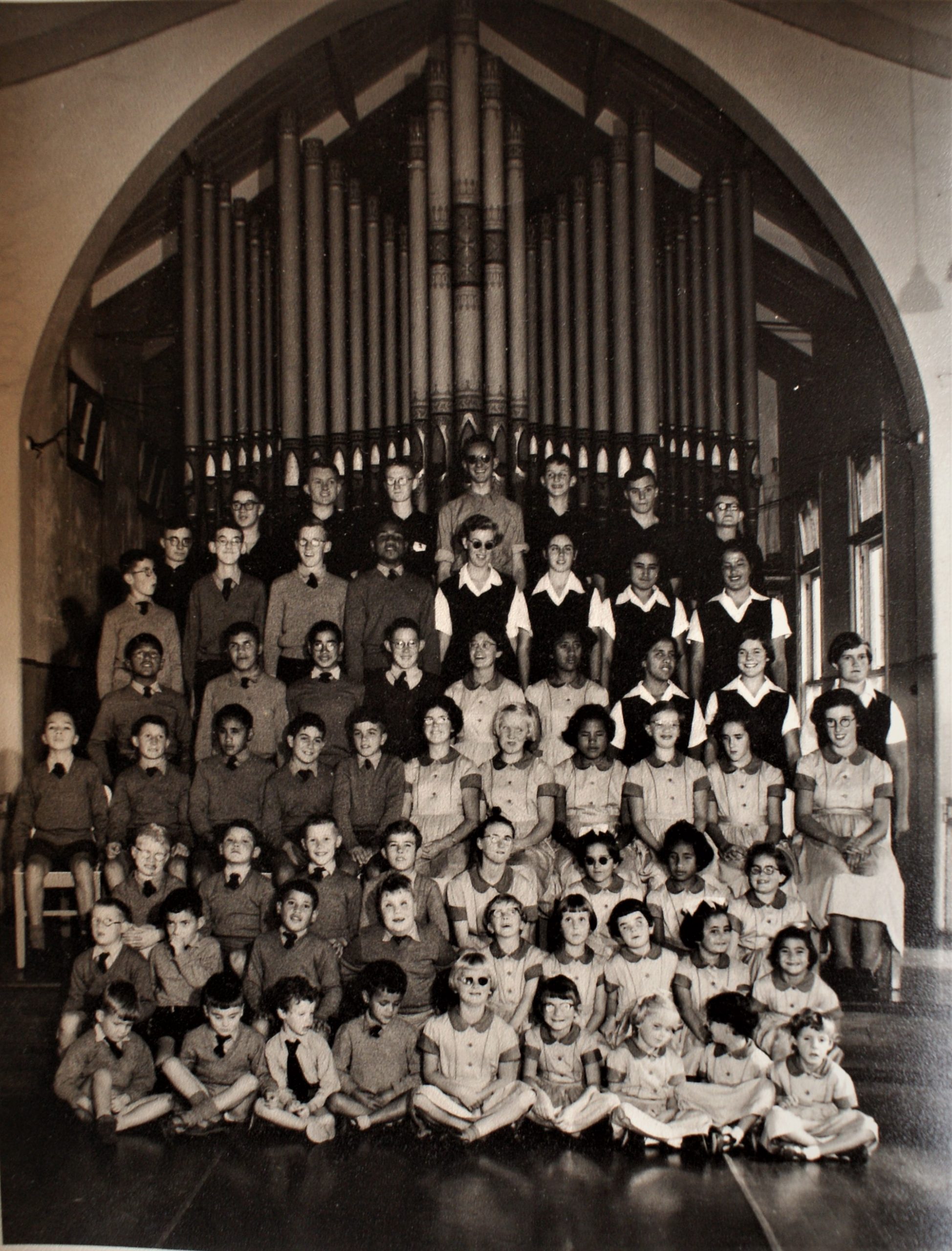
Music
A group of us would go downstairs and sing pop songs of the 1950s like Lollipop, Pearly Shells and Happy Birthday Sweet Sixteen, until breakfast time at 8 o’clock. I was taught to play the piano by instruction from a blind music teacher. Although I could play a bit by ear, it was not the accepted way to learn in those days. Later on I learnt to read the sighted stave and was able to do some exams and some competition work by memorising my pieces. Miss Martin, who was also blind, was my music teacher at the Blind Institute while I was at school. She taught from Braille music and told me the notes to play. Mrs Helen Meikle was the one who taught me the sighted stave when I was working at the Health Camp in Whangarei. My practice time was 8.30 am until 9.00 am at which time the school day began. The main meal was at midday. The food was good and tasty. We were well fed. After school we were given a piece of fruit every day, including weekends.
Free Time
We made our own amusement by listening to the Lever hit parade. Every Thursday at 4.00 pm we would rush upstairs to the playroom, turn the radio on and all was quiet while we heard the pop songs. We listened and started to choose the ones we thought we could work with. We would put them into four-part harmony and sing unaccompanied. These were some of the girls: Maureen Erahi, Marlene Lindsay, Beverly Mitchell and Tina, a Niuean girl whose surname we never learnt. And me, of course!
Outside School Time
We had our own Brownie pack which I joined at age seven. I learnt how to knit, do knots and darn socks. We would get badges for each thing we achieved. At age 11, I went to Girl Guides where we learnt to go outdoors and go hiking. We also went to camp and even lit a campfire, cooking baked potatoes and bananas split in their skins. We went with other groups who helped us with the cooking. Because of my sight, I was able to help with some of the cooking.
We would go for walks in the weekends to the Auckland Domain or Mt Hobson and sometimes we would go to church fairs and spend some pocket money. That was fun. Another source of fun was cleaning the dorms on a Saturday morning. After breakfast we would have to dust all the window sills. When it came to the wooden floors, the best way to polish them was to have someone sitting on a mat, being pulled up and down the spaces between the beds. It was a load of fun, because we would have races and sometimes collide with the furniture at the end of the dormitory.
Holidays
During the school holidays we would go home to our families. In the May holidays Mum and Dad would take their holidays while the cows were ‘dry’. That meant there was no milking to do. We would often go to Woolley’s Bay and rent a cabin with the Miller family who came up from Auckland. Aunty Lucy Miller was Mum’s younger sister. Then there was Uncle Allan and our cousin John. The weather was often still warm enough to go swimming and we played on the beach most of the day. Another family who would come to the cabins was the Wilsons who had a larger family. On Fridays we would go to their bach and have fresh bread and golden syrup. Yummm! This only lasted until my brother Ross pimped on us!
One year as well as Ross and myself, my parents took my cousin Moira and Ross’s close friend Murray on holiday. Moira’s parents who also came were dairy farmers too. We went to Rotorua and stayed at Lake Rotoiti in the cabins where we had to put half a crown in the meter to get power for hot water and cooking. The currency was sterling in those days. One evening we went by launch to the little island in the middle of the lake to the hot pools. They were so lovely in the clear moonlight. We slept well that night. That was one of the highlights of that trip. Another day we watched the Maori children jumping off the bridge and into the river for money. We walked to see the hot pools which looked like a big pot of porridge bubbling away.
Another time Aunty Vera, Mum’s youngest sister and Uncle Jack came with our cousins Lyn and Graham. I must have been about 11 years old. They were dairy farmers as well. It was to the South Island we went this time. I remember the beautiful bright colours of the autumn leaves in the brilliant sunlight and the lovely scented roses in Christchurch. I remember how hilly Dunedin was and how wide the streets were in Invercargill. A friend of Mum’s offered us their house for a few days, so we were able to freshen up our clothes for the return trip home. Having done that, we drove out to Bluff and looked for Stewart Island, but it was hidden away in the clouds. It was just a grey old day!
Church
On Sundays the girls at the Foundation all went to church. The Catholics and the Methodists went to their own churches and the rest of us went to St Mary’s Cathedral just down the road. I was curious as to why we needed to have so many churches and asked questions about their beliefs. About the age of 12 the staff asked me if I would take the Catholic girls down to St Johns for their catechism at 9am on Saturday mornings. This I did and wandered around the shops for an hour until they were finished. On returning to the convent to collect them, the nuns would let me play the piano so they knew I was there. It was on the walk home when I would ask the girls about what they were doing in their classes, that I came to know more about the Catholic faith. I had questions for those who went to their own churches too, for I was really quite intrigued.
My 13th year was dull and uneventful except for a girl who tried to strangle me with a scarf, leaving me with an abscess on my throat which took some time to heal. I don’t really remember the incident that well, but it must have triggered something. It could be said I was a bit depressed that year.
My First Bible
Things started to change. I sensed that Jesus was telling me to buy a Bible. I had been home for the Christmas holidays and had been to an Anglican church meeting where the Church Army had made a call for those who wanted to give their hearts to the Lord, but I was too shy to go up in the meeting because Mum and Dad were there. While supper was being served I told them that I would like to give my heart to Jesus. They gave me a leaflet with a painting of Jesus standing at the door holding a lantern and the words “Behold, I stand at the door and knock. If any man hear my voice, and open the door, I will come in to him, and will sup with him, and he with me.” Revelation 3 verse 20.
Nana had given me money for Christmas and I brought it back to school where I knew it would be kept by Miss Whitehill who was in charge of looking after our pocket money. When I told her what I wanted to buy she took me to the Baptist bookshop on Queen St where we found a large-print Bible. It was the King James Version in Old English. I still have it although it is rather tattered and worn. This was so kind of her as she was a Catholic. About that time I heard that the movie The Ten Commandments was showing at the Embassy Theatre and I asked Miss Faroley if we could go to see it. To my amazement the whole school went to a 10am session and at half time we had an apple to eat. The movie was 3 hours long so we had lunch when we got home.
The Matron, Miss Bertleson, left in 1959. Mrs Thompson, who took over, allowed the Anglican boys and girls to be confirmed at St Mary’s Cathedral. It was the first time we had been able to do this. Mum and Dad came down from Whangarei to my confirmation and I didn’t even know they were coming. I experienced a real presence of the Lord’s love. It turned out that a cousin I didn’t know was confirmed at the same time, so I went to their place for supper with my parents. I believe the Lord was in that too.
Hearing From God
In November that year I found out that Billy Graham’s Crusade meetings were being held at Carlaw Park and asked if we could go. I had to find five other girls to go with me and a staff member to take us. This had to be the Lord as I was able to find them all quickly. We went by bus to Carlaw Park on a beautiful starlit evening and it was there that I did give my heart to the Lord. I didn’t need follow-up as the Lord looked after me and I did what Billy Graham said. His advice was to start reading the Bible at St John’s Gospel and read it three times before reading any other books in the Bible. This gave me a good grounding of who Jesus is and why He came and what He wanted to achieve. I was a senior girl now and had my own room, so I started to read St John’s Gospel the minute I got home. I was on cloud nine after the crusade and this feeling lasted for quite a while. I even offered to pray for people including a girl at school who fell out of a tree. Baptism in water and in the Holy Spirit came some years later.
Leaving School
Some of us who were leaving school at the end of the year were asked if we would help in the workshop to fill a contract assembling cartons to pack bottles into. So I offered to work and received my first pay packet. But the workshop wasn’t the place for me as I spent more time coughing and sneezing than getting the work done. I was asked what kind of work I wanted to do and was offered a position on the staff as a housemistress. I declined this offer because I was too close to the age of the girls I would be looking after. For some unexplained reason, I felt certain that I would be working at the Health Camp at Maunu in Whangarei. Looking back, I would see that as a sovereign prophetic word from God because I had never even heard of the Maunu Health Camp before this. For about 18 months I was at home on the farm helping Mum in the house and garden. I would go and drive the tractor for Ross so he could feed out the hay or turnips to the cattle. Dad taught me how to drive the car and I managed to get it through the gate without scraping the new paint. Mum didn’t think I could do it. We had sold the farm on Three Mile Bush Rd and had bought another much larger farm in Ngaratanua, not far from Kamo. Dad wanted to try sheep farming as well as some drystock. Sheep were quite a different kettle of fish. They needed to be shorn and dipped, and the lambs needed to be tailed. I remember nearly falling into the dip but I grabbed a woolly jumper (a sheep) and managed to stay dry. My parents weren’t used to having me around which meant I was contending with an attitude where they thought I was not capable of doing things. This subconscious attitude continued, so whenever I could I would defy it. Attitudes like this confronted me throughout my life and I have learnt to overcome through perseverance and confidence in who I am.
